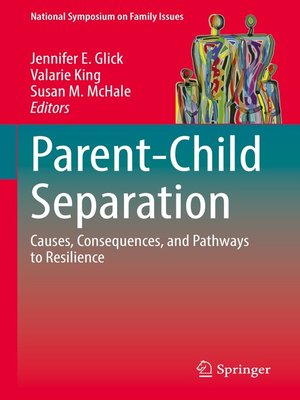Parent-Child Separation
ebook ∣ Causes, Consequences, and Pathways to Resilience · National Symposium on Family Issues
By Jennifer E. Glick

Sign up to save your library
With an OverDrive account, you can save your favorite libraries for at-a-glance information about availability. Find out more about OverDrive accounts.
Find this title in Libby, the library reading app by OverDrive.



Search for a digital library with this title
Title found at these libraries:
| Library Name | Distance |
|---|---|
| Loading... |
This book examines the similarities in children's short- and long-term development and adjustment when they have been separated from their parents because of larger institutional forces. It addresses the unique circumstances and the similarities faced by parents and children under three different institutional contexts of separation: parental migration and deportation, parental incarceration, and parental military deployment. Chapters describe the difficulties faced by families in each of these circumstances, along with the challenges in conducting research under the multidimensional and dynamic complexities of parent-child separation. Finally, the volume offers recommendations for creating supportive structures and interventions for families facing separation that can bolster youth well-being in childhood and beyond.
Featured areas of coverage include:· Parental migration.
· Parental incarceration.
· Parental military deployment.
· Undocumented migration and deportation.
· Child-parent relationship and child resilience and adjustment.
Parent-Child Separation is a must-have resource for researchers, professors, clinicians, professionals, and graduate students in developmental psychology, family studies, public health, clinical social work, educational policy, and migration studies as well as all interrelated disciplines, including sociology, criminology, demography, prevention science, political science, and economics.






